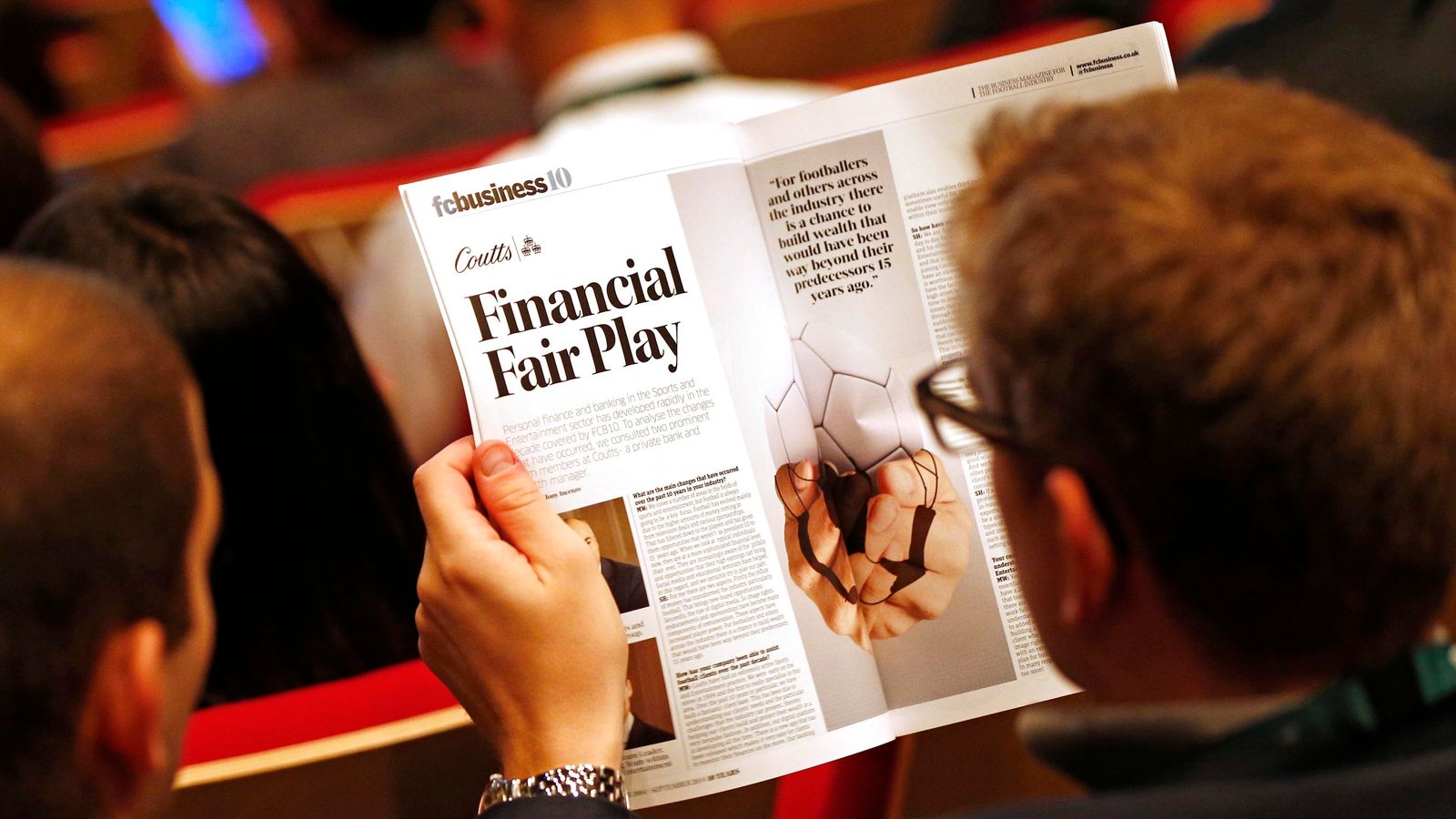Financial Fair Play, or FFP, won’t be a new term for anyone who’s even marginally interested in football.
It’s a set of rules designed to stop football clubs from spending more than they generate.
Many of us know that clubs like Everton have fallen foul, and been punished, and others (like Manchester City and Nottingham Forest) are facing charges. But it can be difficult to cut through the noise and understand what the actual rules and issues are.
Let’s get you up to speed on what the current legislation is and means – as well as what changes could be implemented later.
FFP or PSR?
Admittedly, it needs to get a little more confusing before it gets clearer.
Both the Premier League and UEFA (football’s European governing body) have stopped using the term FFP.
Steve Wright, BBC Radio presenter, has died
Steve Wright: ‘Shocked’ stars pay tribute to ‘gifted’ BBC radio DJ and presenter following his death at 69
Labour suspends parliamentary candidate Graham Jones over ‘unacceptable’ Israel comments
The Premier League now goes with the “PSR” moniker instead – which stands for “Profit and Sustainability Rules”. UEFA rebrands its regulations as “Financial Sustainability.”
The regulations differ but soon should align.
What are the Premier League rules?
For now, there are different rules for each country and each league – but we’ll give you the Premier League set for ease.
In its simplest possible terms, teams need to make sure they aren’t recording a loss greater than £105m across the combined accounts of the previous three seasons.
That’s the headline figure to work off, but annoyingly, it’s not that simple.
The Ts & Cs
That £105m is caveated by the fact that £90m must be covered by “secure funding” from a club’s owners.
Secure funding is a fancy way of saying “buying up more shares”, rather than an owner simply lending their club money.
That means a club can only lose £15m of its “own” money every three years.
In other words – any loss above £15m but below £105m has to be guaranteed by club owners. If it isn’t, or you go above that £105m limit, you are in breach of the rules.
To add to the confusion, certain costs can be deducted – such as investment in youth development, infrastructure or community projects, among other examples.
The rules are similar as you go down the leagues and tiers of English football, run by the EFL – the figures just get smaller (the Championship’s top figure, for example, is £39m).
A quick example
Club X and Club Y each spend £18m over budget across three seasons. That’s £3m over the PSR limit.
Club X has secure funding to cover that £3m, but Club Y does not. Club X is therefore in the clear – as the club itself has only recorded a loss of £15m (the owner’s shares cover the rest).
Club Y, on the other hand, is in breach of the rules – meaning it must produce a financial plan for the next two seasons and offset the losses with more secure funding (owners buying up more shares).
That doesn’t sound so severe, right?
Harsher punishments
It’s going over the £105m figure that sees the harsher punishments – with rulebreakers referred to an independent commission, which can dish out heavy fines or, as we’ve seen this season, points deductions…
Another example:
Club A overspends by £110m across three seasons. The owners’ secure funding covers £90m of that – meaning the club itself has lost £20m. That’s £5m over the £15m threshold – and the club is now in breach of PSR.
This brings us nicely to Everton.
Everton
The blue half of Merseyside has endured a rough few years. That was compounded by a Premier League announcement earlier this season that the Toffees would be slapped with a 10-point deduction – throwing the club into a relegation battle.
“Following a five-day hearing last month, the commission determined that Everton FC’s PSR calculation for the relevant period resulted in a loss of £124.5m, as contended by the Premier League, which exceeded the threshold of £105m permitted under the PSRs,” read a Premier League statement on 17 November last year.
Everton actually recorded losses of £370m during the period it was charged for (2018-2021), but rulemakers allowed all clubs large deductions because of the COVID-19 pandemic, and chunks of that total figure were spent on those allowable expenses we outlined earlier (like on the stadium, infrastructure, women’s teams etc).
Even with those deductions and other factors Everton considers mitigating circumstances, it was judged to have spent £19.5m over the allowable threshold.
Read more:
Premier League faces fresh legal battle over rule changes
Premier League admits VAR delays spoiling fans’ enjoyment of football
The club was also found to have misled the league over the source of stadium funding and its intention to raise cash from a player sale.
The club has grounds for an appeal, which is ongoing.
Nottingham Forest and Everton (yes – again)
This calendar year, although still young, has seen the Premier League refer two clubs to the independent commission over breaches.
Everton will once again send its financial whizzes to face the panel after further breaches were identified by the league, while relative Premier League new boys Nottingham Forest have a slightly different set of rules to play by.
Forest’s permitted losses are lower than the £105m limit because the club was in a lower division for a year of the accounting period. Secure funding-wise, the club is only allowed £13m each for the 2020-21 and 2021-22 seasons when the team were in the Championship, added to £35m for last season, which they played in the Premier League.
Both clubs have been referred to that independent commission we mentioned earlier, and we wait to see what any punishment actually looks like.
Closing loopholes
The Premier League moved to ban long-term amortisation recently.
That is the spreading out of the cost of a transfer over the course of multiple seasons.
Case in point: Chelsea.
The Blues, for three successive years (six transfer windows), signed players for huge fees on big contracts to avoid being hit by PSR.
Moises Caicedo joined for a mooted £115m on an eight-year contract worth a reported £150,000 per week. If those figures are correct, that means the deal is worth a total of £177.4m – one so high it would have undoubtedly set alarm bells ringing in the legal and finance departments of the west London club.
The solution? Spreading the cost of that transfer over eight years – breaking it down into the far more PSR-friendly chunks of £22.18m per year.
Chelsea completed similar deals for Enzo Fernandez, Mykhailo Mudryk and Christopher Nkunku, before the loophole was closed.
Clubs have now ruled the maximum number of seasons you can spread the cost of a transfer over is five.
Manchester City
Well done for sticking with it for so long – now we’ve arrived at the big one.
For this, we’ve enlisted the help of our sports correspondent Rob Harris…
Sports correspondent
The Premier League investigation into Manchester City is its largest and most complex.
This is not just a simple matter of determining whether the club overspent in the pursuit of glory.
The accusations feature deception to circumvent the rules, failing to provide accurate information and lack of cooperation – amounting to 115 charges.
Proving the case could be challenging.
The evidence – claims sponsorship income was inflated and linked to the Abu Dhabi ownership – emerged in documents obtained from within the club through the Football Leaks hacker.
Were it not for the emails and documents from City and the UAE, this case would probably never exist.
There has never been any detailed denial of allegations – only an insistence from City that “irrefutable evidence exists in support of its position”.
They did succeed in overturning a UEFA ban when some of the allegations were investigated by European football’s governing body with the case in part found to be time-barred.
But City were fined €10m for obstructing the investigation.
Abu Dhabi wealth has transformed City into a force since Sheikh Mansour’s takeover in 2008.
Whether the formation of an all-conquering squad was within the rules will determine how all the success is viewed.
And any punishments – which City will strongly contest – could have far-reaching repercussions.
What changes could we see?
Recent reports indicate that sweeping changes could be imminent, with suggestions new rules could be in place by the summer – Premier League clubs last week held a series of discussions, with PSR one of the key points on the agenda.
However, Sky News understands that while changes are expected to take place eventually, it is unlikely they will be in place any time soon.
For changes to the legislation as it stands, clubs would need to agree on new rules and get it past the Premier League itself – which would need to make sure tweaks or additions allowed its members to compete within UEFA and FIFA regulations, while balancing the financial needs of clubs in the lower football leagues.
What are UEFA’s plans?
UEFA believes its use of “fair play” was misconstrued – as it didn’t necessarily make competitions fairer.
Be the first to get Breaking News
Install the Sky News app for free
Squad cost rules have just been introduced. They mean, by 2025, competing in the likes of the Champions League will require clubs to only spend 70% of revenue on salaries and transfer fees.
Club owners will be allowed to cover losses of €60m across three years or €90m if the clubs are judged to be in good financial health.











